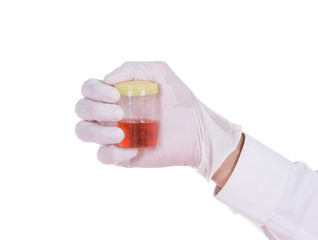Overview
Catheters are used for various medical purposes, and the specific use will depend on the type of catheter used. One of the most prevalent uses of catheters is urinary catheterization. Urinary catheterization is the most common procedure in hospitals, with an estimated 20-30 million urinary catheterizations performed annually in the United States alone.
A urinary catheter is inserted into the bladder through the urethra to drain urine. This can be done for a short period (intermittent catheterization) or a more extended period (indwelling catheterization). This is often done for individuals who are unable to empty their bladder on their own. This includes patients with spinal cord injuries, urinary retention, or certain urology conditions.
Please note that the use of catheterization may vary depending on the country's healthcare system, and the availability of technology, services, and trained healthcare providers.
Hematuria or blood in the urine is a relatively common condition. The exact prevalence of hematuria varies depending on the population being studied and the definition of hematuria used. Some studies have found that hematuria occurs in about 3-4% of the general population. However, some other studies have found that it occurs in up to 10% of people.
The prevalence of hematuria increases with age and is higher in men than in women.
Please Note: Prolonged use of a catheter can lead to complications such as urinary tract infections, sepsis, and other conditions.
So, how long does bleeding occur after catheter removal?
The presence of blood in urine after catheter removal can vary depending on the individual and the reason for the catheterization. In most cases, the blood should clear up within a few days to a week. However, if the hematuria persists, or you experience pain or difficulty urinating, you must contact a healthcare provider for further evaluation.
Your well-being is our priority - call us to book your appointment today
Are you wondering why a catheter insertion in the bladder causes bleeding? Continue reading to understand why bleeding occurs after catheter removal.
Is blood in urine after catheter removal normal?

Blood in urine after catheter removal can be a normal occurrence in many cases. The insertion and removal of a catheter can cause temporary irritation and minor injuries to the urinary tract, leading to blood in the urine. Typically, this blood should clear up within a few days to a week as the body heals.
However, if the blood persists or is accompanied by pain, discomfort, or difficulty urinating, it is important to consult a healthcare provider for further evaluation, as these symptoms may indicate an underlying issue that requires medical attention.
How long does blood in the urine last after catheter removal?

The duration of blood in the urine after catheter removal can vary from person to person. In most cases, it is considered normal to experience blood in the urine for a few days to a week after catheter removal. The presence of blood is often a result of minor injuries or irritation to the urinary tract during the catheterization process. However, if the blood persists or is accompanied by other concerning symptoms, it is advisable to consult a healthcare provider for a thorough evaluation to rule out any underlying complications or conditions.
What are the possible causes of blood in urine after catheter removal?

There are several potential causes of blood in urine after catheter removal, including:
Trauma to the urethra | The catheter may have caused irritation or injury to the urethra, leading to bleeding. |
Infection | An infection in the urinary tract can cause inflammation and bleeding. |
Bladder or kidney stones | Stones can cause irritation and bleeding as they pass through the urinary tract. |
Prostate issues | Enlarged prostate or prostate cancer can cause blood in the urine. |
Medications | Certain medications can cause blood in the urine as a side effect. |
If you are wondering what to expect and how to deal with hematuria, don’t worry, we shall discuss that as well.
Let’s start with the symptoms of blood in urine after catheter removal.
What are the symptoms of blood in urine after catheter removal?
The main symptom of blood in the urine is the presence of red, pink, or brown-colored urine. Sometimes, the blood may not be visible to the naked eye and can only be detected through a urine test. Other symptoms that may be present with blood in urine after catheter removal include:
| Pain or discomfort during urination | |
| A frequent urge to urinate | |
| Cloudy or strong-smelling urine | |
| Pain in the lower back or side | |
| Fatigue or weakness | |
| Nausea or vomiting | |
| Inability to urinate |
Please Note: Some of these symptoms may also be caused by other conditions. A medical evaluation is required to determine the cause of the blood in the urine.
So, what could be the underlying problems of passing bloody urine after catheter removal?
What are the potential complications associated with blood in urine after catheter removal?
Blood in urine after catheter removal can be a sign of a severe underlying condition, and if left untreated, it can lead to complications. Here are some possible complications of blood in urine:
Anemia | Blood loss can lead to a decrease in the number of red blood cells, causing anemia. |
Renal or kidney failure | Blood in the urine can be a sign of kidney damage, which can lead to renal failure if not addressed in time. |
Tissue damage | Blood clots can form in the urinary tract, leading to damage to the bladder, ureters, or kidneys. |
Urinary tract infections | Blood in the urine can increase the risk of urinary tract infections. |
Bladder cancer | Long-term or recurrent hematuria can be a sign of bladder cancer. |
Prostate cancer | Blood in the urine can be a sign of prostate cancer. |
Note: Please consult a doctor if you are experiencing blood in urine after catheter removal. A medical expert can determine its underlying cause and provide appropriate treatment to prevent complications.
Continue reading to understand the possibility of you having hematuria after catheter removal.
What are the risk factors associated with developing blood in urine after catheter removal?

There are several potential risk factors for developing blood in the urine (hematuria) after catheter removal, including:
- Prolonged catheterization: The longer a catheter is in place, the greater the risk of developing hematuria upon removal.
- Trauma to the urethra: The insertion and removal of a catheter can cause trauma to the urethra, which can lead to bleeding.
- Infection: A urinary tract infection (UTI) can cause inflammation and bleeding in the urinary tract.
- Bladder or urethral cancer: Hematuria can be a symptom of bladder or urethral cancer.
- Other medical conditions: Certain medical conditions, such as kidney stones, can cause hematuria.
- Medications: Some medications, such as blood thinners, may increase the risk of bleeding.
Please Note: Blood in the urine after catheter removal is not always a severe problem and may resolve on its own. However, if the bleeding does not stop or you experience other symptoms, such as pain or difficulty urinating, it is crucial to get medical attention.
Now let us understand how hematuria can be treated.
Want to inquire about your personalized treatment expenses? Don't hesitate. Talk to us today.
What are the treatment options for blood in urine after catheter removal?
Treatment for blood in the urine after catheter removal may depend on the underlying cause of the bleeding. Some potential treatment options include:
Observation | If the bleeding is mild and not accompanied by other symptoms, it may be appropriate to observe the individual for a period to see if the bleeding resolves on its own. |
Medications | Medications, such as analgesics (pain relievers), antibiotics (if an infection is present), or anti-inflammatory drugs, may be prescribed to help manage symptoms and reduce inflammation. |
Hydration | Drinking plenty of water can help flush out the urinary tract and reduce the risk of infection. |
Follow-up testing | Additional testing, such as urine tests, imaging scans, or a cystoscopy (a procedure that allows the doctor to look inside the bladder), may be done to determine the underlying cause of the bleeding and guide treatment. |
Surgery | In some cases, surgery may be necessary to treat the underlying cause of hematuria, such as removing a bladder or kidney stone or removing a tumor. |
Please remember it is essential to get medical attention to determine the cause and appropriate treatment.
According to the healthreportive -
Occasionally, users using intermittent catheters may observe blood in their pee. When the catheter is removed, the blood or blood clots remain in your urine for several weeks. This occurs as the internal wounds (also known as surgical cuts) heal and the scabs come off. Drink extra liquids until you stop seeing blood in your pee if you do. Especially after walking and bowel movements, it is typical for your urine to be pink-tinged to crimson during the following two weeks. Increased fluid intake will often restore urine clarity. Check to see if your catheter is kinked and if it isn't draining. This is particularly possible where the tape is.
Now that we have a better understanding of urethra bleeding after catheter removal, let’s learn how we can prevent it.
Prevention of blood in urine after catheter removal

Several steps can be taken to prevent blood in the urine (hematuria) after catheter removal:
- Minimize the duration of catheterization: The longer a catheter is in place, the greater the risk of developing hematuria upon removal. It's essential to only use a catheter for as long as it's medically necessary.
- Use proper technique: Inserting and removing a catheter should be done using a sterile technique. This will help minimize the risk of infection and trauma to the urethra.
- Monitor for signs of infection: A urinary tract infection (UTI) can cause inflammation and bleeding in the urinary tract. It's important to monitor for symptoms of a UTI, such as:
· frequent urge to urinate
· pain or discomfort while urinating
· cloudy or foul-smelling urine
- Follow post-catheter care instructions: It's essential to follow the post-catheter care instructions provided by the medical professional. This includes maintaining good hygiene, drinking plenty of water, and avoiding strenuous activities that could put pressure on the bladder.
- Be aware of other medical conditions: Individuals with medical conditions that increase the risk of hematuria, such as kidney stones or bladder cancer, should be especially vigilant in monitoring for symptoms of bleeding and seeking medical attention if they occur.
Have further questions?
References:
https://www.niddk.nih.gov/health-information/urologic-diseases







